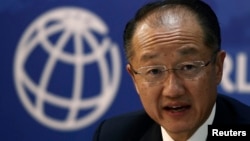World Bank President Jim Yong Kim challenged governments around the world Thursday to address the problem of inequality by promoting the idea of shared prosperity. But he said doing so will require tailoring policies to help the bottom 40 percent of populations in developing countries.
Kim described a three-step process to reduce inequality: Growing the economy, investing in people, and safety nets to reduce the risks of falling back into poverty. Kim said the strategies will differ from one country to the next.
“A low income country may need to ramp up agricultural productivity. Middle income countries may focus more on urbanization, building safe, clean, livable cities. For countries where most children don’t go to primary school, this has to be the first goal that is achieved,” said Kim.
Kim rejects ‘trickle-down’ economics
The World Bank says economic growth, accompanied by rising wages and job creation, has been the most important factor in reducing poverty and boosting shared prosperity over the past 50 years. But Kim said economic growth alone will not be enough to reduce growing income inequality. Speaking to an audience at the United States Institute of Peace in Washington, Kim cited a recent OXFAM study that shows the richest 85 people in the world control as much wealth as the bottom 50 percent.
“We reject trickle down notions that assume that any undifferentiated growth permeates and fortifies the soil and everything starts to bloom even for the poor. We need to find an economic growth model that lifts up the poorest citizens rather than enriching only those at the top,” said Kim.
Invest in people
In an era of slowing global growth, Kim said countries need to do everything they can to boost growth. That includes enacting reforms, such as eliminating fossil fuel subsidies. Another important step is to build more equitable and more transparent tax collection policies. But Kim said investing in people, especially in their health and education, may be one of the most critical actions any country can take to promote growth. One of the most cost effective investments, said Kim, is making sure citizens have access to universal health care.
“Only when everyone in the world can expect to receive health care and be healthy can we really seriously talk about equality of opportunity,” said Kim.
For every dollar invested in health care, Kim said, the returns have been tenfold. In just the past 10 years, Kim said health insurance initiatives have accounted for 24 percent of all income growth in low- and middle income countries. Kim laid out the World Bank's goals for shared prosperity ahead of the upcoming World bank-IMF annual meetings to be held in Lima, Peru later this month.




